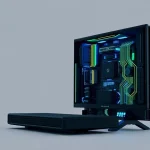Developers release fix for macOS Tahoe slowdown bug

In the ever-evolving world of technology, software updates can sometimes bring unexpected challenges. This was the case for users of macOS 26 Tahoe, who recently encountered a significant slowdown in GPU performance within popular Electron applications. Fortunately, developers have been quick to respond, rolling out fixes to address these issues. Let's explore the intricacies of this situation, the underlying causes, and the steps being taken to restore functionality.
As software continues to integrate into our daily lives, understanding the frameworks that underpin our favorite applications becomes increasingly important. With that in mind, let's dive into the details of the GPU slowdown issue and the subsequent fixes that are being implemented.
Understanding the GPU slowdown in macOS Tahoe
With the launch of macOS 26 Tahoe, many users began to report a critical issue: significant GPU slowdowns while using various popular applications built on the Electron framework. These applications, which include well-known names like Discord, Slack, and Visual Studio Code, experienced performance drops that frustrated users and affected productivity.
The root cause of this slowdown was traced back to a specific private API known as cornerMask. Private APIs are generally designed for internal use by Apple and are not thoroughly tested for third-party application development. When macOS Tahoe altered the behavior of this API, it negatively impacted the performance of Electron apps, resulting in increased GPU usage and overheating issues.
- Popular Electron apps affected: Discord, Slack, Visual Studio Code, Figma, and more.
- Common user complaints: Slow performance, increased heat, and overall system lag.
- Underlying issue: Changes to the cornerMask private API in macOS Tahoe.
Developers begin rolling out fixes
In response to the issues stemming from the cornerMask API, the Electron team has worked diligently to address the problem. The latest versions of Electron have removed the dependency on this private API, allowing developers to update their applications accordingly.
Thanks to a handy tool called ShameElectron, users can track which popular applications have been updated to incorporate these fixes. This tracker provides a straightforward way to see which apps have resolved the GPU slowdown issue.
Some of the major applications that have successfully updated their Electron versions include:
- Discord
- Figma
- Notion
- Visual Studio Code
- Slack
- MongoDB Compass
- Obsidian
However, not all prominent applications have implemented the necessary updates. Some notable examples that are yet to address the issue include:
- 1Password
- Bitwarden
- Dropbox
- Windsurf
- Cursor
For a complete and up-to-date list, users can refer to the ShameElectron tracker.
Why is macOS 26 Tahoe experiencing these issues?
The challenges faced by macOS 26 Tahoe highlight the complexities of software development and the reliance on specific APIs. Apple often updates its APIs to enhance functionality, but these changes can inadvertently disrupt third-party applications that depend on them.
In the case of macOS Tahoe, users reported multiple symptoms, including:
- Increased GPU usage leading to slow application performance.
- Overheating of devices, especially during extended use.
- General system lag and unresponsiveness.
As developers continue to adapt their applications to the new operating system, it is expected that many of these issues will be resolved in subsequent updates.
Is macOS 26 Tahoe the final version?
As of now, macOS 26 Tahoe is the latest official release. However, Apple regularly introduces updates, including minor revisions to address bugs and performance issues. The rollout of fixes for the GPU slowdown problem is just one example of how user feedback can lead to rapid improvements.
Users should keep an eye out for updates, as Apple typically releases patches that improve stability and performance. Additionally, developers are encouraged to stay current with Electron updates to ensure their applications function optimally on new macOS versions.
User experiences and community feedback
Community feedback plays a vital role in identifying and resolving issues within software ecosystems. Users have taken to forums and social media platforms to express their frustrations and share solutions. Some notable discussions include:
- "macOS Tahoe is full of bugs" - A thread detailing various user experiences.
- "macOS 26 is horrible" - Users discussing their struggles with performance issues.
- "Tahoe 26 overheating my M4 MacBook Pro" - Reports of thermal issues following the update.
These discussions highlight the importance of community engagement and the sharing of knowledge to navigate technical challenges.
Looking ahead: Future updates and improvements
As developers continue to release fixes and users adapt to changes in macOS Tahoe, it's clear that the future holds promise for improved performance and stability. Apple and third-party developers must collaborate to ensure a seamless experience across devices.
In the meantime, users should proactively check for updates to their applications and monitor community discussions for any emerging solutions. By staying informed and engaged, users can help mitigate the impact of such issues on their productivity.
For further insights into macOS updates and user experiences, you can watch this informative video:
Staying updated on both system and application changes is crucial in today's fast-paced technological landscape. Embracing these updates can significantly enhance your experience while using macOS and its applications.
Recommended accessories for enhancing your Apple experience:




Leave a Reply